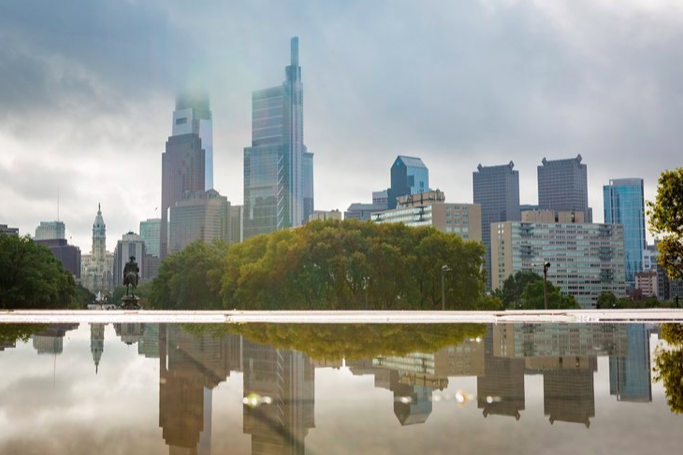
October 27, 2020
 Thom Carroll/for PhillyVoice
Thom Carroll/for PhillyVoice
COVID-19 transmission rates have spiked in Philadelphia during October, with average weekly case counts hitting their highest point since May. The city health department is reviewing the possibility of new coronavirus restrictions.
The fall surge of COVID-19 continues to accelerate in Philadelphia, prompting public health officials to review whether new restrictions may be necessary to contain the spread of the virus.
In light of the concerning trends, the city is strongly recommending against holiday family gatherings over the next few months.
Philadelphia Health Commissioner Dr. Thomas Farley reported 340 additional confirmed cases of COVID-19 on Tuesday, along with 22 probable cases confirmed by rapid antigen testing. On Monday, the city had reported a three-day total of another 1,020 confirmed cases.
"We anticipate further rapid increases in this infection in Philadelphia, which means we're entering a difficult, dangerous period of this epidemic," Farley said. "Possibly the worst period of this entire epidemic. We hope to have a vaccine soon, but much of this surge will happen before the vaccine arrives."
The city will continue to monitor patterns of infection and determine whether additional COVID-19 restrictions may have to be implemented, or others rolled back.
"If we identify specific settings where we have evidence of substantial spread, we may restrict or prohibit those activities," Farley said. "We have some restrictions in place that we have never released before, and we're not imposing any new restrictions today. But we are considering a range of options."
The "rapidly rising case counts" are the worst the city has seen in several months, the health commissioner also said.
During the week ending on Oct. 24, the city averaged 296 new cases of COVID-19 per day, the highest average since the first week of May. That number is expected to rise as delayed lab results are reported to the health department.
In the previous week ending Oct. 17, Philadelphia had averaged 205 new cases per day.
The test positivity rate as of Oct. 24 stood at 7.2%, the highest that number has climbed since the first week of June. In the previous two weeks, that number had reached 5.1%. The low was 2.8% in September and the peak was 39% in early April, when testing was still limited to those with clear symptoms of the virus and the highest risk of a severe infection.
"The increases in case counts we're seeing are occurring in every age group, from children through people in their 70s," Farley said. "They're increasing in every racial and ethnic group and they're increasing in every ZIP code in the city."
"If we identify specific settings where we have evidence of substantial spread, we may restrict or prohibit those activities ... We're not imposing any new restrictions today. But we are considering a range of options." – Dr. Thomas Farley
Philly's rising cases come as Pennsylvania and the United States are seeing all-time daily highs in COVID-19 cases.
Philadelphia also is beginning to see a growing number people with COVID-19 who require hospitalizations, although area hospitals remain below capacity and the patient load is still manageable. Approximately 211 COVID-19 patients currently are being treated in Philadelphia hospitals, up from a low point of around 90 in September. The peak came in the spring when about 1,000 COVID-19 patients were spread across city hospitals.
The city reported five new coronavirus fatalities on Tuesday, bringing the citywide death toll to 1,864. Deaths continue to be lower than they were during the first wave of the virus, but the city anticipates fatalities could rise during the next few weeks as more cases are identified.
Case interviews through Philadelphia's contact tracing program continue to suggest most COVID-19 transmission is occurring within households, during small gatherings with friends and relatives, and at larger social gatherings.
"This is, for example, when relatives are visiting to help take care of children," Farley said. "Or they're visiting to take care of a person who has a fever. Or sleepovers amongst teenagers. Or a pizza party after soccer practice. Or carpools. Or friends getting together to watch football games on television. Or weddings and bridal showers."
The health commissioner said these gatherings are "very dangerous" because people are in very close contact and they tend to not wear masks.
There also is some evidence that indoor dining at restaurants may linked to some transmission, as these outings have been mentioned more often lately in case interviews.